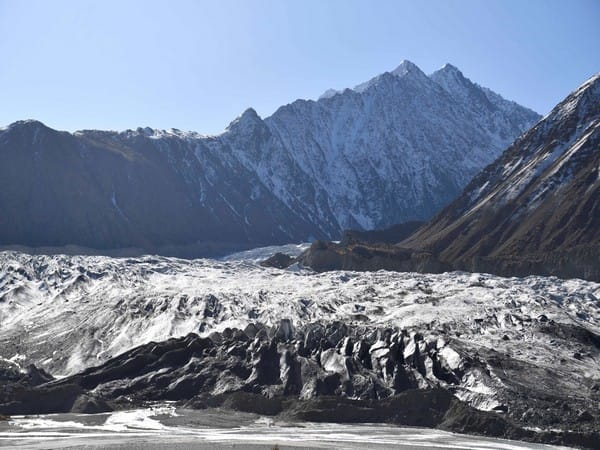Islamabad [Pakistan], July 13 (ANI): The illegal cutting and commercial exploitation of glaciers in regions like Dir, Chitral, Swat, Shangla, Kaghan, Naran, and other parts of Khyber Pakhtunkhwa pose a grave threat to the ecological and climatic stability of the province. These activities flagrantly violate environmental protection statutes and regulations governing KP, Dawn reported.
Pakistan boasts over 7,000 glaciers, forming the largest mass of ice outside the polar regions. Northern Pakistan, crisscrossed by the Karakoram, Himalayan, and Hindu Kush mountain ranges, is a landscape shaped by ice and rock. These glaciers are vital for local communities, providing crucial irrigation and sustaining life in the north. Local inhabitants have developed intricate canal systems to harness glacier meltwater for agriculture.
However, climate change has profoundly impacted Pakistan, causing temperatures to soar and snow to melt rapidly, resulting in devastating floods that frequently destroy villages and claim lives. Like alpine regions worldwide, Pakistan’s glaciers are receding at an alarming rate.
Khyber Pakhtunkhwa is home to approximately 3,050 glaciers, primarily in its northern reaches. These glaciers are indispensable for the region’s water resources and ecological balance. Shockingly, certain individuals and entities are illicitly extracting and transporting glacier ice for commercial gain, cutting glaciers into large blocks. This exploitation rapidly depletes these critical natural resources.
Local reports indicate that during recent years, particularly during Ramazan, 200 to 300 mini-trucks loaded with ice blocks were daily transported from Upper Dir to other parts of Dir, Bajaur, Malakand, and even Mardan Districts. Sadly, much of the local population remains unaware of the glaciers’ vital role in their area’s ecological system, as reported by Dawn.
Despite Pakistan’s obligations under international environmental laws, there is a glaring absence of specific legislation addressing glacier protection at both national and provincial levels. The Environmental Protection Act of 1997, the Khyber Pakhtunkhwa Environmental Protection Act of 2014, and the Climate Change Act of 2017 do not mention glaciers, highlighting a critical legal void given their pivotal role in the region’s ecological and climatic stability.
In 2010, Argentina set a global precedent by passing the world’s first national glacier protection law, which bans mining, industrial activities, and other harmful practices near glaciers. In January 2024, Tajikistan followed suit with its own glacier protection legislation.
The unauthorised cutting of glaciers flagrantly violates existing environmental protection laws and regulations in KP. These actions demand immediate investigation and the enforcement of appropriate legal penalties against the perpetrators. Glacier depletion disrupts fragile ecological balances, adversely affecting local flora and fauna.
The loss of glaciers undermines biodiversity preservation efforts and threatens endangered species in these regions. Glaciers also play a critical role in global climate regulation by reflecting solar radiation and maintaining temperature balance. Their reduction accelerates global warming and climate change, with severe repercussions for weather patterns, agriculture, and human health.
These glaciers serve as vital freshwater reservoirs. Their degradation will significantly reduce water availability for local communities, agriculture, and wildlife, jeopardising food security and livelihoods. The natural beauty and pristine environments of these regions attract a substantial tourist influx, contributing significantly to the local economy. Glacier destruction threatens tourism revenues, causing economic losses for communities dependent on this sector.
Pakistan, a signatory to the Paris Agreement and numerous international climate and environmental protection treaties, is obligated to safeguard its glacier reserves. The United Nations Framework Convention on Climate Change, including the Kyoto Protocol and Paris Agreement, mandates greenhouse gas reduction efforts crucial for mitigating glacier melt and preservation.
Article 2 of the Paris Agreement aims to limit global warming to well below two degrees Celsius, with efforts to cap the increase at 1.5°C, critical targets for curbing glacier melt rates. The Convention on Biological Diversity advocates for conserving biological diversity and sustainable use of its components, emphasising in-situ conservation like protecting glacier ecosystems to maintain species viability, as reported by Dawn.
The United Nations Convention to Combat Desertification addresses land degradation, including safeguarding water sources and glaciers crucial for regional hydrological stability. Articles 10 and 11 of the UNCCD emphasise national action plans to combat desertification and promote sustainable land management practices.
The United Nations 2030 Agenda for Sustainable Development, encompassing 17 Sustainable Development Goals (SDGs), underscores glacier protection under SDG 13 (climate action) and SDG 15 (life on land), which aim to combat climate change, preserve terrestrial ecosystems, and halt biodiversity loss.
Both KP and federal governments bear a responsibility to enact legislation safeguarding glaciers and must act promptly to fulfill this obligation, Dawn reported. (ANI)
This report is auto-generated from ANI news service. ThePrint holds no responsibility for its content.






